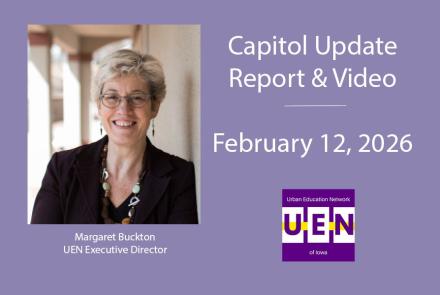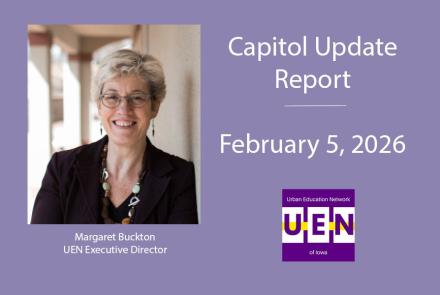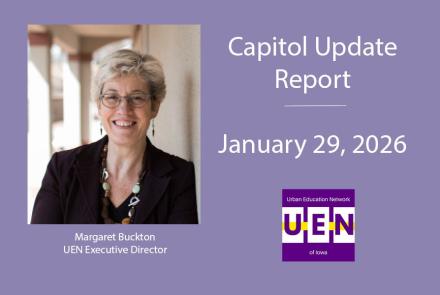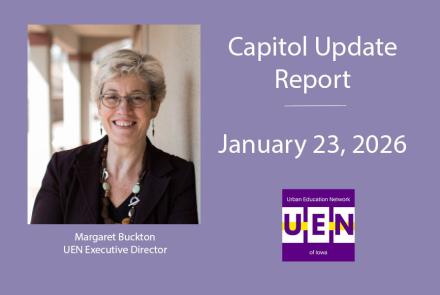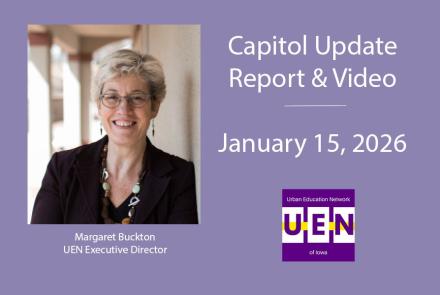UEN Comments on Proposed Rules HF 68 Education Savings Accounts - June 13, 2023
UEN Comments Regarding Proposed Rules HF 68 Education Savings Accounts
June 13, 2023
Download the Print-Friendly UEN Comments
Download the DE Proposed Rules Chapter 20, Students First Act May 4, 2023
Thank you for the opportunity to comment regarding proposed rules to implement the applications process, administration and oversight of education savings accounts (ESA) as enacted by HF 68 this Session. When such significant policy is enacted in a very short time with a compressed legislative process, as happened early in the 2023 Session with HF 68, we anticipate legislative corrections and fine-tuning will likely unfold over the next year or two as the entire system learns what might be missing or needs clarification along the way. These comments center on the proposed rules ACR 7023C Notice of Intended Action before the Administrative Rules Review Committee on June 13.
The Department (DE) was granted emergency rulemaking authority in Sec. 2 of HF 68:
Sec. 2. Section 256.9, Code 2023, is amended by adding NEW SUBSECTION. 66. Adopt rules relating to the administration of, and applications for, the education savings account program pursuant to section 257.11B, including but not limited to application processing timelines and information required to be submitted by a parent or guardian.
It is important to note that the Legislature set the expectation for the DE to establish rules in two distinct areas: 1) administration of, and 2) applications for the program, with the important phrase of “including but not limited to”, which provides broad authority. The comments below are either technical corrections/clarifications regarding the specifics proposed or suggested additions of what should be included to implement the program with accountability where included in the legislation and with appropriate reporting back to public schools regarding the impact of ESA participation on public school enrollment.
Regarding Education Therapies: Definitions 20.1(6) “Qualified educational expenses” cross-references directly back to Iowa Code 257.11B, which is appropriate. We appreciate including subsection (a) which appropriately defines “education therapies” with a training expectation and prohibits “therapies” provided by the students’ family members. This is a good step in preventing waste, fraud and abuse experienced in other states implementing ESA programs.
Regarding Online Education: Subsection (b) states: For purposes of this definition, approvable “online education programs” means online education programs provided by online education providers approved by the DE under Administrative Rules Chapter 281-15. HF 68 includes in “Qualified education expenses” that nonpublic online education programs expenses are allowed, and we would support including the word “nonpublic” in these rules to clarify. This makes it clear that to access a public-school online education approved, approved by the DE, a student would have to enroll in the public-school online program, either as a resident of the district or via open enrollment. To access a nonpublic online program, the student would have to enroll in an accredited nonpublic school, which would then provide them with an online program approved by the DE. As is true under current law, approved program private providers which market to and enroll students directly, are not eligible for tuition paid by public schools, or under HF 68, but ESAs. Administrative Code 281 --15.12(6) specifies:
“Prohibition on offering a completely online educational program. Unless specifically authorized by statute or by a governor’s proclamation on a temporary basis, no school district, accredited nonpublic school, or AEA shall provide a completely online educational program, including completely online instruction for a particular grade. All school districts, accredited nonpublic schools, and AEAs must maintain a physical presence for their educational programs.”
Service providers for student with disabilities: Proposed 20.1(6)(d) should be amended with the following underlined phrases to set the expectation that the “accredited provider” is accredited to provide services for students with disabilities and either holds the credential through the BOEE or any other credential issued by the State of Iowa to provide services in the student’s Individual Education Plan (IEP). A good example of language would be to include the Personnel Qualifications from DE Rules for Special Education Personnel, which also prohibits such personnel from having certification or licensure waived:
The qualifications for related services personnel and paraprofessionals:
• are consistent with State-approved certification, licensing, registration, or other comparable requirements that apply to the professional discipline in which those personnel are providing special education or related services;
• ensure that related services personnel who deliver services in their discipline or profession meet the requirements of the previous item and have not had certification or licensure requirements waived on an emergency, temporary, or provisional basis; and
• allow paraprofessionals and assistants who are appropriately trained and supervised in accordance with Iowa law to be used to assist in the provision of special education and related services under this part to children with disabilities.
Eligible Students Residency: public school district enrollments are diligent about confirming residency. Although this determination may not be high-stakes for either nonpublic schools or the State, it matters for categorical fund purposes for the public-school district of residence. Proposed 20.2(3) defines enrollment in a nonpublic school as having attended the nonpublic school at any point in the immediately preceding school year. As the program is phased in, this limitation helps to focus initial eligibility on students transferring from public school (or homeschool, as they also would not have attended a nonpublic school in the prior year), incoming kindergarteners and those students from families below the 300% Federal Poverty Level (FPL) income threshold in this first year of implementation. Without this definition, a family may withdraw their student from nonpublic school before the end of the school year in an attempt to become eligible before their income threshold was applicable. This definition makes sense. We encourage the DE and the third-party provider to be diligent in verifying residency and tracking if families have moved since their initial application to ensure that the categorical funds provided to public school districts of residence align with the actual residence of the student.
Timing of Funding to the ESAs: Proposed rule 20.4(2) states that enrollment into the nonpublic school for the first semester and subsequent enrollment and attendance at the midpoint (end of first semester) is confirmed. This is a good accountability touch-point to ensure the ESA deposit meets the first test of attending an accredited nonpublic school. The collection of this information should also inform the DE’s annual report to the General Assembly regarding the program, as it will accumulate information about the longevity of student participation in the program and whether students withdraw or are expelled from the nonpublic school. UEN schools already experience these transitions and welcome back students who initially began the school year in a nonpublic school, but return to public school. Although HF 68 did not specify, a policy correction for the next legislative session should require funds remaining in the ESA to be returned to the State and, based on timing, returned to the public school district to which the student reenrolls.
Participation in State/Federal Assessments: The Proposed Rule ARC 7023 does not include any provisions for the implementation of state and federal assessments required by HF 68 to be taken by ESA recipient students. Nonpublic school staff will likely require training on administering the testing. Baseline expectations for student participation, similar to requirements for public schools, should be specified. HF 68 also mandates reporting of test scores by the nonpublic school to the parents of participating students and to the DE. The DE is required to include assessment information in the Annual Condition of Education Report. Throughout Administrative Rules Chapter 281, there are many requirements explicitly stated for DE reports, assessments and data collection. It is critical to lay out the process for nonpublic schools to participate so the assessment information has validity and is meaningful to both parents and policymakers. The reporting of the test score is an additional confirmation that the ESA recipient is still enrolled and participating in the nonpublic school, which is the primary requirement of eligibility.
Language from HF 68 requiring the assessments, NEW 257.11B, Subsection 11:
b. The department of education shall compile all such reported assessment results in order to analyze student proficiency and academic progress among those pupils participating in the program, including analysis of graduation rates, proficiency, and progress based on grade level, gender, race, and household income level. The results of the department’s analysis shall be included in the annual condition of education report.
Reporting of Enrolled & Eligible Students to Public Schools: The Proposed Rule ARC 7023 does not include any reference or expectation that the DE notify public school districts of resident students enrolled in an accredited nonpublic school and granted participation in the ESA Program. This reporting is critical. Public schools staff classrooms and apportion budgets and programs based on student needs and enrollment. Adjustments made early, before school starts, are the least disruptive and most efficient in helping to minimize the financial impact that will soon follow.
Administrative rules should specify when public school districts will be notified of resident students already enrolled in nonpublic schools first receiving the ESA. These students are counted for categorical funds for the resident district, which will impact public school district budgets in the subsequent budget year (counted Oct. 1, 2023, with funds generated beginning July 1, 2024). The public school will retain an average of $1,208 in categorical funds for students with an ESA, but they will lose a minimum of $10,000 per transferring student (Regular Program District Cost, Instructional Support, Dropout Prevention, State Penny for School Infrastructure) not including student weightings, federal funds or other grants if based on enrollment. Additionally, if a student is open enrolled into another school district, if they leave the receiving district for the nonpublic school, the receiving district will no longer receive the tuition for that student. The receiving district does not receive the categorical funds since those go to the resident district. The DE should report to the district previously enrolling the student, as well as to the resident district, to help inform staffing and budgeting decision at both districts.
We appreciate the opportunity to provide comments. Thank you for undertaking the work of emergency rulemaking required by the statute, which had to be hastily accomplished, while engaging in this thorough process to encourage public input.
UEN Contact:
UEN Executive Director, Margaret Buckton, margaret@iowaschoolfinance.com (515) 201-3755
UEN Chair, Matt Degner, Superintendent, Iowa City, Degner.Matt@iowacityschools.org (319) 688-1000



